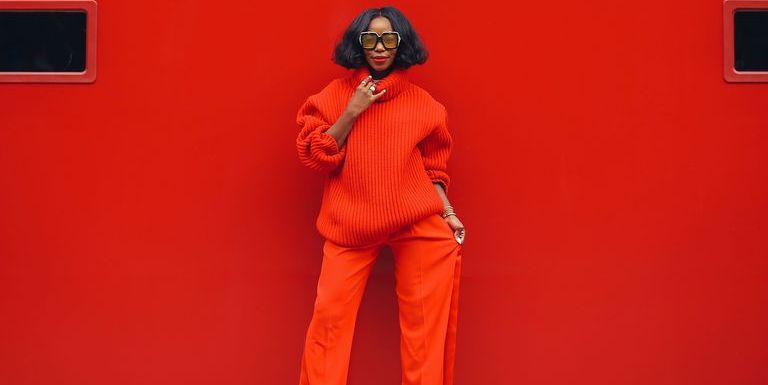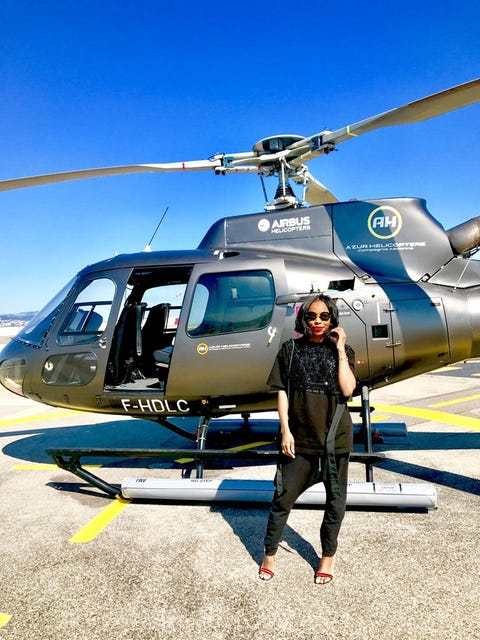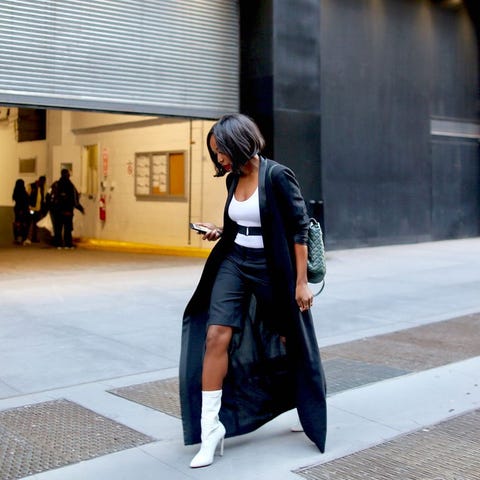I remember the incident like it happened yesterday. I had been invited, along with a small group of other editors, on an exclusive press trip for a luxury brand in France. Everyone in the group was considered a beauty VIP; they were people I’d admired my entire career. On the first morning of our trip, when I showed up in the hotel lobby to meet our group for breakfast, I dressed the part. Nothing too over-the-top: Balmain blazer, jeans, and a Chanel bag—casual, by my standards. I’m all smiles. Bubbly. Excited to get the trip started. When out of the blue, one of the other editors shoots me a conspiratorial sideways glance and blurts out,“Sooo…. Who’s your trick daddy?”
It caught me completely off guard. Instantly, my entire mood changed. One: What ever happened to “Good morning”? Two: Why is this woman using slang to talk to me? And three: Would she be asking me this question if I were white or Asian? Even as a joke, it would have been in bad taste. But after a brief moment of silence and a blank stare, I knew she wasn’t joking. “I mean, how can you afford all those designer clothes?” she clarified, driving home the completely racist underbelly of her question. This white woman was seriously questioning how I was able to afford the clothes on my back. Specifically asking what man, or “trick daddy,” purchased them for me. I felt disrespected. Of all the editors on the trip, she had the most clout. She was a veteran beauty director who had worked in the industry for over 20 years. Somehow, I managed to laugh it off, but it wasn’t funny. And over the course of my career, it had become an all-too-common occurrence. Small slights. Said in jest. In front of colleagues. With a hint of a smirk. Just enough to make you feel less than.
Fortunately, this incident wasn’t indicative of my overall experience as a Black woman in the beauty industry. I spent the majority of my career as an editor at a fashion publication where I was promoted numerous times and felt incredibly valued. I had a white boss who appreciated my Blackness and made me feel integral to the company rather than inconsequential. I hired Black interns and assistants, wrote Black stories, and profiled and helped elevate Black makeup artists and hairstylists—and she encouraged me at every step. If she saw a bus coming, she’d pull me out of the way instead of throwing me under it. She gave me exposure, made sure I was paid a competitive salary, and taught me the importance of being a leader in my own right. I also had an incredibly supportive editor-in-chief who personally called me into his office to tell me he was putting me in media training because there weren’t enough Black faces on TV.
But being Black in a predominantly white industry comes with its challenges. I didn’t have to wait long to experience microaggression in the industry. It happened at the very first beauty event I attended.
Things started out pretty typical. The brand hosting the event sent a car service to pick me up from my office. When I arrived, I noticed that I was the only Black woman in attendance—nothing out of the ordinary. Since I was a newbie, I walked around the room introducing myself. Unbeknownst to me, one of the women I approached was the beauty director for one of the most influential fashion magazines in the world. Here’s where things got weird. “Hi, I’m Kahlana,” I said with a smile, extending my hand to shake hers. I’ll never forget the expression on that woman’s face when she looked at my hand. You would’ve thought I was holding a dead fish. It was like she was literally repulsed by my presence. She looked me up and down, rolled her eyes, and walked away. Thankfully, another beauty director, a white woman who witnessed the encounter, asked if I wanted to sit next to her. To this day, every time I see her, I remind her that she was the person who made me feel comfortable at an industry event where “social distancing” had an entirely different meaning.
The daily desksides, though, were even more problematic and illustrated the bigger challenges within the beauty industry as a whole. Every week, executives from various beauty brands dropped by our office to show off their new product launches. I remember one deskside so vividly. The PR director from a prestigious brand I’d always loved was so excited and proud to show me their new collection of foundations. “Wait until you see this new formula, and I have the perfect shade for you,” she said. That would be a first, I thought. I watched with excitement as she pulled out a collection of 12 foundations. She set the darkest shade in front of me. Is this some kind of joke, I thought, looking at the bottle. The shade wouldn’t have even matched Beyoncé’s skin tone, and I’m much darker. “This is way too light for me,” I said.“You think?” she responded. “Let’s try it on the back of your hand, because I really think once it’s blended down it will adapt to your skin tone.” I’m going back and forth in my mind about whether or not I want to play this game with her. Does she think all Black people are the same complexion? And, at this point, if a brand is only offering 12 shades, none darker than J.Lo, it’s clear that the Black community isn’t their target audience. I let her put a swatch of the foundation on my hand, and her response was one I’ve heard all too often: “We’re actually planning to expand our shade range later this year.”
But as my career evolved, so did my voice. I figured, If my voice was the only Black voice in the room, I’d clear my throat and express my opinions boldly. Not only for myself, but for my people. Instead of letting snarky comments from white beauty directors slide, I began to clap back. When a brand showed up to my office without a full color range, I challenged them on their limited collections. Because what am I really contributing to this industry if I’m not using my platform to stand up for what is right?
How can I ever expect to see change if I’m not doing my part in raising awareness of mistreatment and outdated perceptions? Over the years, one thing I’ve realized is that no matter how hard I push for fairness or equality, I can’t make a difference alone. No one person can. It takes continuous allyship to truly effect change. In the beauty world, this calls for editors, publicists, marketing executives, and creative directors alike to take a good look around: At the faces in the room at brand events they attend. At the lack of minorities on set at the photo shoots they arrange. Then take a hard look in the mirror. Take a moment for self-reflection. And make an honest assessment of where they stand in all of this. It may call for them to ask themselves some tough questions. Like, Is there anything more that I can do to make this a more inclusive industry? Have I taken advantage of opportunities to speak out when I’ve noticed that there were no people of color on press trips? How would I feel if I were a minority trying to find my way in this industry? Have I been a part of the problem or the solution?
The truth is, I wouldn’t have made it to where I am today without the genuine support of people from all racial and ethnic backgrounds. Along the way, I’ve had several white colleagues and mentors who have helped amplify my voice. Some who have said my name in rooms full of opportunities. And others who have become lifelong friends. That’s why it’s best to treat people the way you would want to be treated, regardless of their skin color. You never know: One day, the hand you refused to shake may turn out to be the same hand you reach out to for a favor.
Case in point: Six months ago, the same woman who had disrespected me in France all those years before sent me a glowing email, saying she thought our vibes were on similar levels and suggesting we should be friends. This time, I smiled. I didn’t type what I wanted to. Instead, I was reminded of Michelle Obama’s famous quote: “When they go low, we go high.” The truth is, our vibes aren’t on similar levels. I’m vibrating much higher.
This article appears in the September 2020 issue of ELLE.
This content is created and maintained by a third party, and imported onto this page to help users provide their email addresses. You may be able to find more information about this and similar content at piano.io


